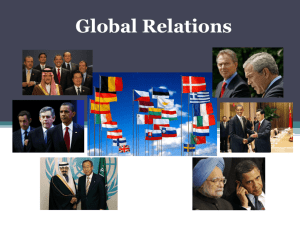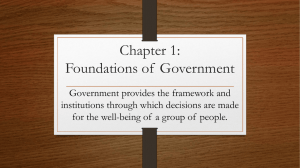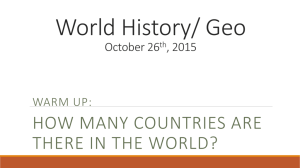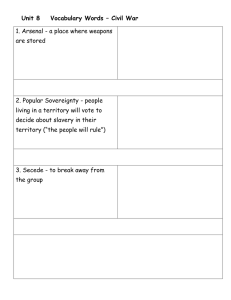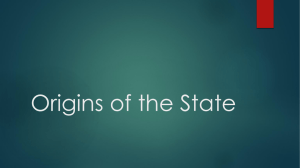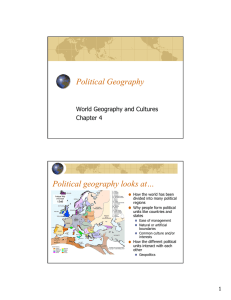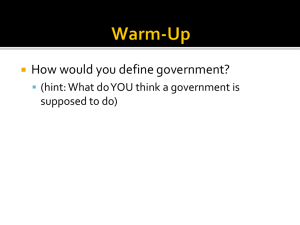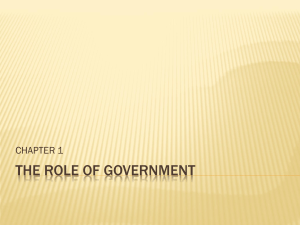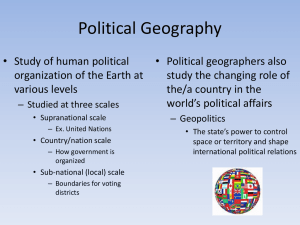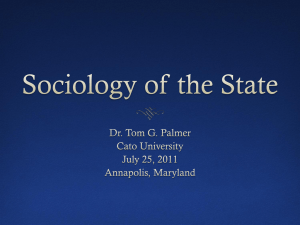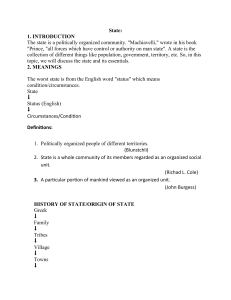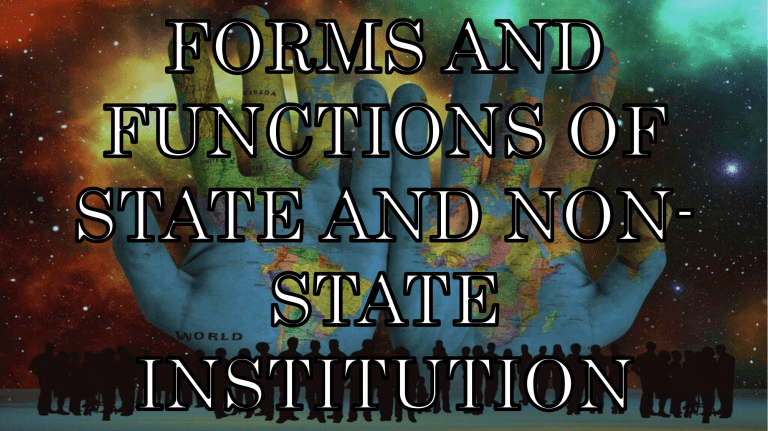
A state is an organized political community acting under a government and united by common set of laws. It uses absolute power in directing the path of a society. It also uses complete political coerciveness, which may come in the form of armed forces personnel, stricter laws, and rigid government policies in order to attain its societal goals and objectives. Market exchange is the primary form of economic subsistence of a state wherein standardized currencies are being used to exchange commodities. States differ in sovereignty, governance, geography, and interests. It may be classified as sovereign if they are not dependent on, or subject to, any other power or state. Other states are subject to external sovereignty where ultimate sovereignty lies another state. The concept of the state is different from the concept of government. A government is the particular group of people that controls the state at a given time. In other words, governments are the means through which the state power us employed like applying the rule of law. The concept of the state is also different from the concept of a nation, which refers to a large geographical area and the people therein who perceives themselves as having a common identity. The state is a political geopolitical The State intends to be a strong actor in the performance of the three important political functions. The state, in full form, 1. maintains control over violence in its domain 2. allocates resources and rewards at its discretion, and 3. stands as the major focus of identity for 1. POPULATION It is the people who make the state. Population is essential for the state. Without population there can be no State. 2. TERRITORY There can be no state without a fixed territory. People need territory to live and organize themselves socially and politically. It may be remembered that the territory of the states includes land, water and airspace. 3. GOVERNMENT It is the organization or machinery or agency of the State which makes, implements, enforces, and adjudicates the laws of the state. 4. SOVEREIGNTY It is the most exclusive elements of State. Without sovereignty no state can exist. State has the exclusive title and prerogative to exercise supreme power over all its people and and territory. It is the basis which the State regulates all aspects of the life of the people living in its territory. A. AUTHORITARIAN GOVERNMENT Authoritarian governments differ in who holds power and in how control they assume over those who govern. An example of this type is Monarchy. MONARCHY Monarchy is a form of government in which supreme power is absolutely lodged with an individual, who is the head of the state, often for life or until abdication. The person who heads a monarchy is called a monarch. Some monarchs hold unlimited political powers while many constitutional monarchies, such as the United Kingdom and Thailand. Currently, 44 nations in the world have monarchs as head of state. TOTALITARIANIS Totalitarianism is a political M system that strives to regulate nearly every aspect of public and private life. It theoretically permits no individual freedom and that seeks to subordinate all aspects of individual life to the authority of the state. Modern examples of totalitarian states include the Soviet Union under Joseph Stalin, Nazi Germany under Adolf Hitler, the People’s Republic of China under Mao Zedong, and North Korea under the Kim Dynasty. B. OLIGARCHIC GOVERNMENT It is a form of government in which power effectively rests with a small-elite segment of society distinguished by royalty, wealth, family, military, or religious hegemony. An oligarchy does not have one clear ruler, but several powerful people who rule. One common example is theocracy. THEOCRACY Theocracy is a government by divine guidance or by official who are regarded as divinely guided. Leaders are members of the clergy, and the state’s legal system is based on religious law. Contemporary examples of theocracies include Saudi Arabia, Iran, and the Vatican. C. DEMOCRATIC Democracy is a form of government in which the right to GOVERNMENT governs is held by the majority of citizens within a country or a state. The two principles of democracy are that all citizens have equal access to power and that all citizens enjoy universally recognized freedoms and liberties. People can either become country leaders through electoral process or elect leaders who represent the core values and beliefs. There are 99 democratic nations globally. Examples of democratic nations are Philippines, Norway, New Zealand, United States of America, Canada, Columbia, Italy, and South Africa. 1. State provides security against external aggressions and war. For this purpose, the state maintains an army. 2. State ensures security against internal disturbances disorders and crimes. For this purpose, the state maintains police. 3. State legally grants and guarantees the rights of the people. 4. The state issues and regulates currency and coinage. 5. State undertakes steps for the creation of necessary conditions for the socio-economic-politico-cultural development of the people. 6. State grants citizenship and protects their interests and rights. 7. State conducts foreign relations, foreign trade and economic
